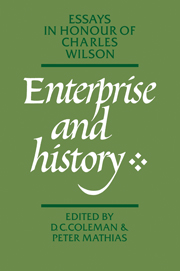Book contents
- Frontmatter
- Contents
- Preface
- List of contributors
- Part I Images and interpretations
- Part II England and the Low Countries in pre-industrial times
- 5 Bruges as a trading centre in the early modern period
- 6 English re-exports and the Dutch staplemarket in the eighteenth century
- 7 ‘Little London’: British merchants in Rotterdam during the seventeenth and eighteenth centuries
- 8 Prejudice and policy: Sir George Downing as parliamentary entrepreneur
- 9 The lawyer as businessman in eighteenth-century England
- Part III Enterprise, finance and politics in the modern world
- Bibliography of Charles Wilson's published works
- Index
9 - The lawyer as businessman in eighteenth-century England
Published online by Cambridge University Press: 12 March 2010
- Frontmatter
- Contents
- Preface
- List of contributors
- Part I Images and interpretations
- Part II England and the Low Countries in pre-industrial times
- 5 Bruges as a trading centre in the early modern period
- 6 English re-exports and the Dutch staplemarket in the eighteenth century
- 7 ‘Little London’: British merchants in Rotterdam during the seventeenth and eighteenth centuries
- 8 Prejudice and policy: Sir George Downing as parliamentary entrepreneur
- 9 The lawyer as businessman in eighteenth-century England
- Part III Enterprise, finance and politics in the modern world
- Bibliography of Charles Wilson's published works
- Index
Summary
This is a very large topic to discuss: available research materials are vast in quantity because solicitors' records (principally the files of their clients), a high proportion dating from the eighteenth century, have survived by the ton in county record offices, if now no longer in the offices of the solicitors themselves. Yet most economic historians, where they have touched on the subject at all, have only nibbled at it from a point on the periphery, by investigating lawyers as bankers, or as stewards of landed estates, or in local capital markets, rather than tackling the subject head-on. More recently great interest has been shown in the connections between property rights, transaction costs and the incentive structure for economic development. But this has been at a singularly abstract conceptual level, seldom invoking lawyers as creatures of flesh, blood and ambition. Other historians, concerned with lawyers as a professional group, have been principally interested in different aspects of the institutionalization of legal functions, particularly the growing professionalization of the practice of law, rather than exploring systematically the actual economic roles undertaken by lawyers. As was written now a generation ago, ‘The country attorney touched eighteenth-century economic life at many points and was undoubtedly a key man; a fruitful field of study awaits a patient historian.’ That systematic study is still awaited. This essay is only a brief survey of the field, based, for the most part, on extant secondary scholarship.
- Type
- Chapter
- Information
- Enterprise and HistoryEssays in Honour of Charles Wilson, pp. 151 - 168Publisher: Cambridge University PressPrint publication year: 1984
- 4
- Cited by



